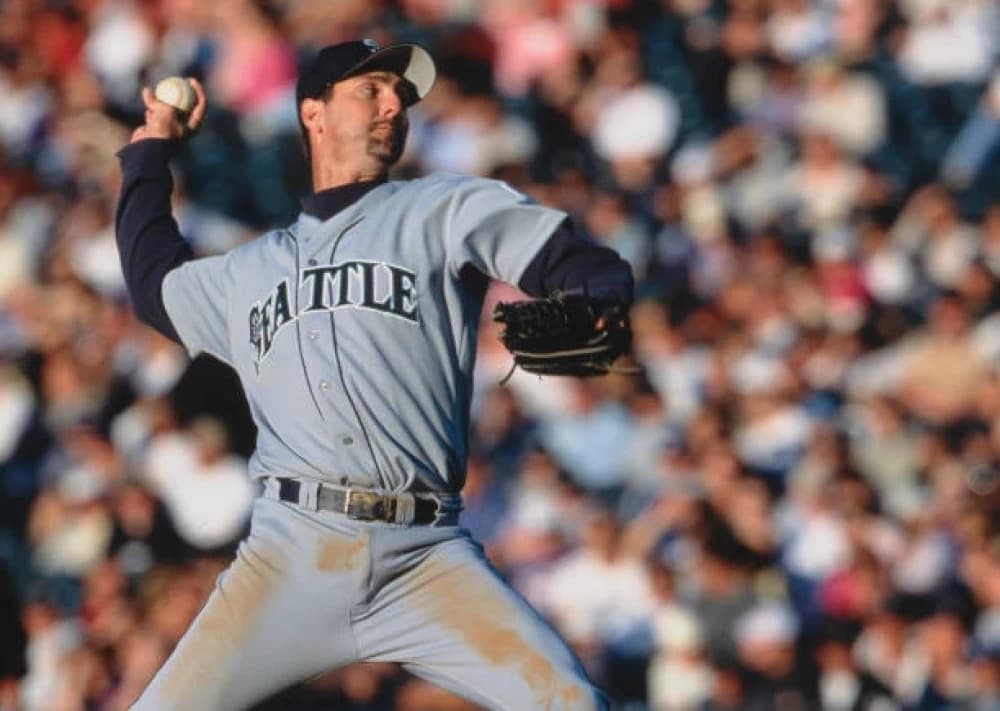Paul Abbott: The Unsung Hero of Mariners History

Paul Abbott’s journey through MLB exemplifies resilience, dedication, and consistent contributions, making him a key yet underrated part of the Seattle Mariners' storied history in the 1990s.
Paul Abbott is a former professional baseball pitcher who built a reliable and enduring career in Major League Baseball (MLB) from 1990 to 2003. Renowned for his modest attitude and diligent work ethic, Abbott was not a pitcher known for overwhelming talent; rather, he relied on accuracy, cleverness, and resilience to secure his spot on various teams. While he did not experience the pinnacle of pitching fame, Abbott's consistent performance, particularly during the 1990s, earned him great respect from his teammates, coaches, and fans alike. His function as a reliable innings eater and a steadfast contributor to his teams' pitching rotations contributed to the longevity of his career, spanning over a decade.
Abbott is perhaps best remembered for his significant contributions to the Seattle Mariners during his time in the major leagues, where he played a crucial role in some of the franchise's historic moments. He not only showcased his worth on the field but also faced and overcame various challenges throughout his career, earning him a reputation as a player known for his resilience.
Key Achievements in Career
MLB Debut (1990): Abbott took to the mound for his Major League Baseball debut on September 5, 1990, playing for the Seattle Mariners against the California Angels. At that time, Abbott was regarded as a promising young talent within the Mariners’ organization, and this debut signaled the start of his ten-year journey in the MLB.
Breakthrough Season (1995): The 1995 campaign represented a pivotal moment in Abbott's career. Following his elevation to the Mariners’ starting rotation, he established himself as one of the team's most dependable pitchers. Abbott concluded the season with a 3.94 ERA over 30 starts, playing a vital role in the Mariners' remarkable playoff run. That year, the Mariners secured the American League Wild Card berth, and Abbott’s consistent performances were essential in ensuring the team reached the postseason.
Career Year (1997): Abbott delivered his most remarkable season in 1997, achieving personal bests in several key metrics. He secured 18 victories, recorded an impressive 3.46 ERA, and accumulated 170 strikeouts. His contributions that season played a significant role in the Mariners achieving a 90-72 record, narrowly missing the playoffs. Although the Mariners fell short of postseason action, Abbott’s performance established him as an essential member of their pitching rotation.
Trade to Tampa Bay (2000): In 2000, Abbott was traded to the Tampa Bay Devil Rays. His time with Tampa Bay was brief, but it represented a pivotal moment in his career as he adapted to being part of a new team. Despite the franchise's struggles for success in the early 2000s, Abbott’s reliable pitching offered essential stability to the rotation.
Return to Seattle (2001): In 2001, Abbott made his return to the Seattle Mariners, where he played a crucial supporting role in the pitching rotation that propelled the team to an American League-record 116 victories. Despite not garnering the same level of national acclaim as some of his fellow players, Abbott's impact on the team's achievement was significant. He provided essential innings and helped stabilize the Mariners’ rotation during one of the most exceptional regular seasons in MLB history.
Final Seasons and Retirement (2003): In the later stages of his major league career, Abbott played for various teams, including the Kansas City Royals and the Minnesota Twins. As his time in the majors came to an end, he continued pitching in the minor leagues and for independent teams, showcasing his passion for the sport and his determination to keep competing. Abbott officially ended his professional baseball career in 2003, after a commendable 13 years in the MLB.
Performance Metrics
Statistics
|
Statistic |
Value |
|
Win-Loss Record |
42-50 |
|
Earned Run Average (ERA) |
4.44 |
|
Strikeouts |
553 |
|
Innings Pitched |
874.1 |
|
Career Best Wins (1997) |
18 wins |
|
Career High ERA (1996) |
5.01 |
Throughout his career, Abbott was not known for accumulating strikeouts at a high level, but he compensated for this with a comprehensive understanding of how to handle hitters. His low walk rates, averaging 2.5 walks per nine innings over his career, along with his capability to pitch to contact, allowed him to remain effective even as his pitch quality started to wane. Abbott’s control and ability to generate ground balls were key factors contributing to his durability as a pitcher.
Perseverance & Comebacks
Throughout his career, Abbott exemplified resilience, especially in overcoming injuries and various challenges. In the early stages of his career, he grappled with injuries that posed serious threats to his future in baseball. Following the 1993 season, he underwent elbow surgery, a significant setback that could have prematurely ended his career. Nevertheless, Abbott showcased the determination that would become a defining trait of his journey, making a strong comeback and continuing to compete as an MLB pitcher for several more years.
Abbott experienced his most significant comeback in 1995 when, following a rocky beginning to his career, he rose to the occasion for the Mariners amid a critical playoff push. Once he was given a permanent spot in the rotation, Abbott became a vital member of the Mariners' pitching staff, assisting the team in reaching the postseason. His ability to thrive under pressure—especially on a team that had faced years of mediocrity—demonstrated his resilience and mental fortitude.
Despite enduring injuries and transitioning between several teams, Abbott's resolve remained unshakeable. By the year 2000, he joined the Tampa Bay Devil Rays and demonstrated his ability to pitch effectively, even amidst the team's difficulties. Abbott's story of resilience serves as a powerful reminder that with the right attitude, athletes facing challenges can still leave a significant mark on the world of professional sports.
Heritage
While Paul Abbott may not frequently appear in discussions among the game's most acclaimed pitchers, his legacy highlights his strong work ethic and consistent contributions to the teams he represented. One of Abbott's most significant legacies lies in his involvement with the Seattle Mariners throughout the mid-1990s, particularly in the critical 1995 season. His efforts that year were pivotal in helping the Mariners clinch a wild card spot, and his tenacity during the team's playoff race marked a crucial chapter in the franchise's history. The Mariners' 1995 squad, which included stars such as Ken Griffey Jr., Randy Johnson, and Edgar Martinez, is often regarded as one of the franchise’s most unforgettable teams, with Abbott’s role as a dependable starting pitcher being vital to that achievement.
The significance of Abbott’s contributions to the Mariners' success in the 1990s is immense, especially for a player who often went unnoticed. While he wasn’t the standout star of the team, he played an essential role in maintaining the team's competitiveness throughout his tenure. His worth was apparent even when he wasn’t the focus of attention.
In a larger sense, Abbott’s legacy embodies the unsung heroes of baseball—athletes who may not be flashy or frequently featured in the media, yet play essential roles in a team’s success. He continues to be a cherished figure among Mariners fans who fondly recall his contributions as a dependable and consistent pitcher throughout the 1990s.
Future Prospects
Since retiring, Paul Abbott has largely stayed out of the limelight; however, his contributions to the Mariners’ achievements during his time with the team are still honored throughout the Pacific Northwest. While a return to professional baseball as a player seems unlikely, Abbott’s legacy will endure in Mariners' history as one of the figures instrumental in establishing the foundation for the team’s future successes. His leadership, consistent presence on the mound, and ability to deliver during crucial moments made him an integral part of the Mariners’ culture, even if he was not the most renowned player.
Looking ahead, Abbott’s journey is now characterized by reflection and gratitude from those who cherish his contributions to the sport. There is a possibility that he may venture into coaching or mentoring roles in baseball, sharing his insights and experiences with aspiring players. Although he may not be enshrined in the Hall of Fame or regarded as a legendary figure in baseball history, Paul Abbott’s influence on the Mariners’ legacy will always be recognized, particularly by those who witnessed his performances during his best years.






